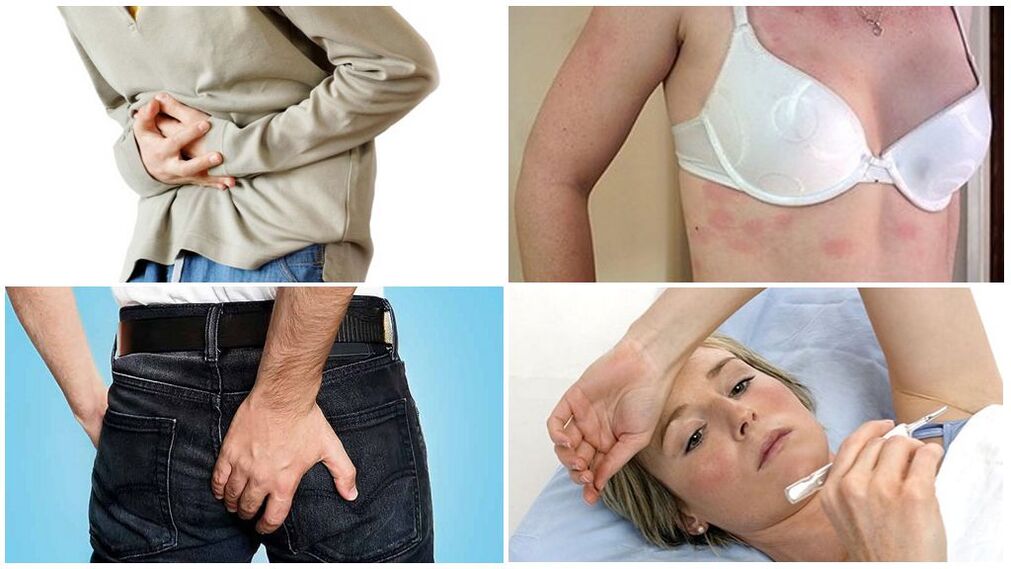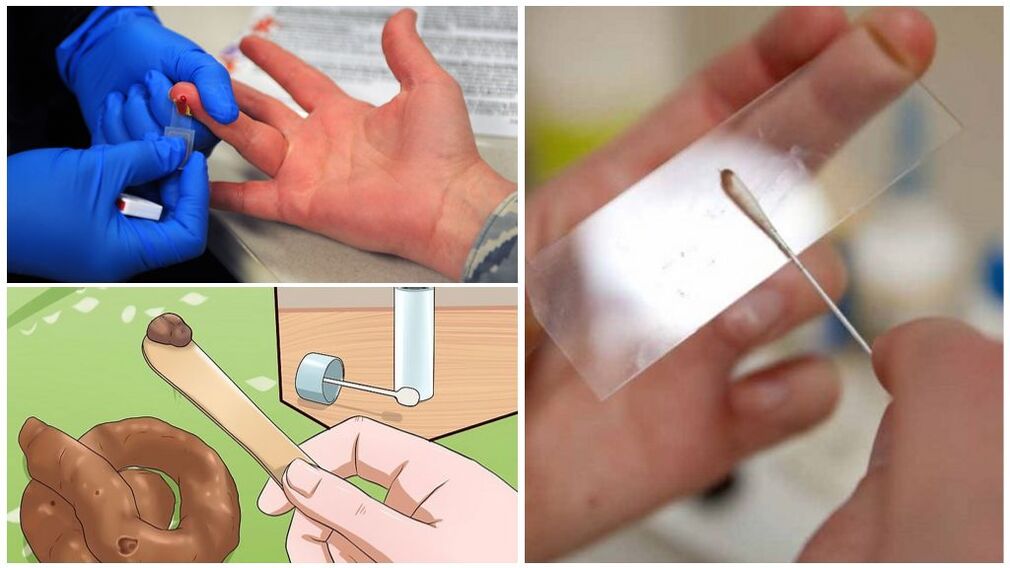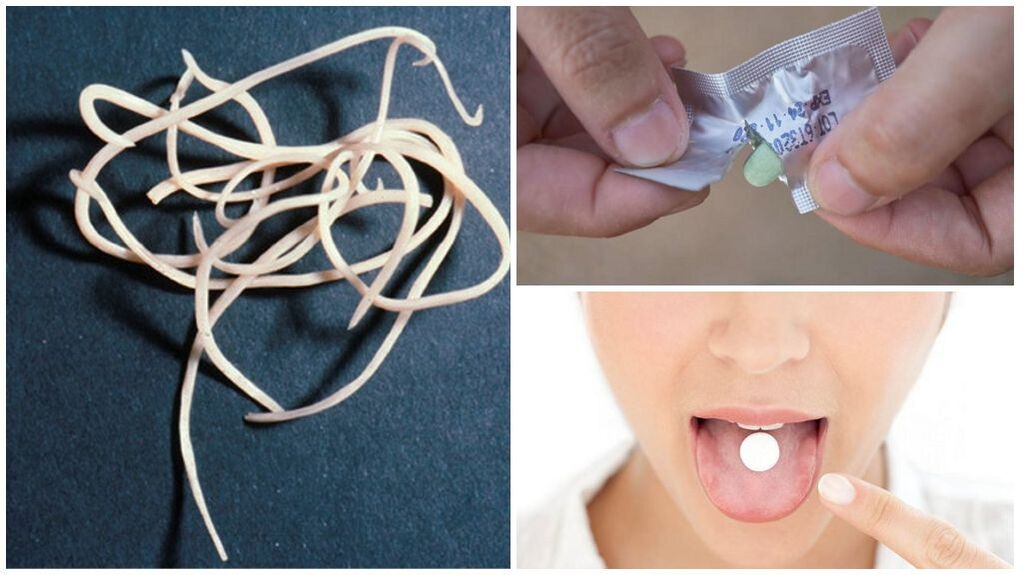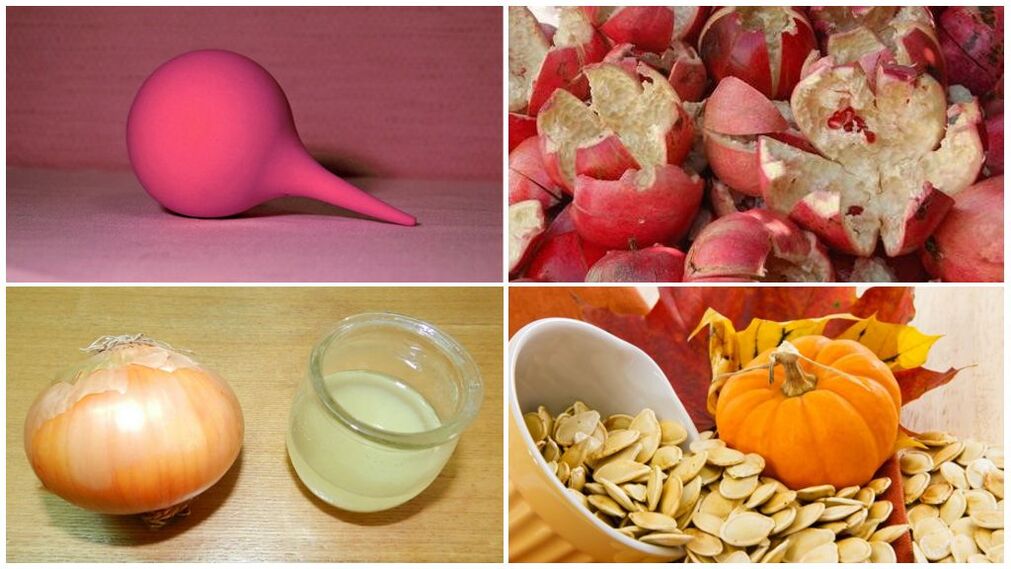Parasitic infestations often go unnoticed. And the first symptoms of worms in humans are non-specific, so the sick person does not go to the doctor for a long time. So the patient may think that he is overworked, gastritisor suffers from poisoning, experiences an exacerbation of allergies or rheumatism.
How to suspect the presence of worms
Symptoms of worms depend on the type of parasite and its location in the body. Some symptoms appear soon after infection. Others occur after some time and are due to migration of worms into the body, increased intoxication, nutritional or vitamin deficiencies. indicate.
The most common symptoms of worms in adults include:
- Increase in body temperature. Fever may be latent - up to 37. 5 ° C, short-lived. Episodes of temperature rise coincide with periods of decline, with an increase in various groups of lymph nodes.
- One of the most common symptoms of the presence of worms is abdominal pain. The sensations of discomfort have a specific localization - in the navel, liver or gait. The pain is accompanied by a violation of the stool, the presence of impurities in the stool - mucus, blood. More often there are symptoms of diarrhea, but with obstruction of the intestinal lumen by parasites, the development of obstruction is also possible.
- Itching in the anus is the first sign and symptom of pinworms. It occurs at night, forcing the person to scratch the anus.
- Helminths cause allergies of the skin or respiratory type as a result of the circulation of their decay products, toxins in the body. So a person complains of exacerbations of bronchial asthma, dermatitis, eczema.
- Beriberi develops when infected with worms. It manifests itself as a deterioration in the condition of the hair, nails, characteristic "jams", dry skin in the corners of the mouth. Iron deficiency anemia in the body, pallor of the skin, Injuries begin to appear under the eyes.
- Helminths also have a pathogenic effect on the nervous system, as a result of which the patient is disturbed by headache, irritability, impaired performance, intermittent sleep and emotional instability.
- The worms migrating through the respiratory tract (roundworms) cause a person to have a dry cough. Movement of parasites into the muscles, with the development of intoxication, sick people complain of pain, muscle and joint pain.

On a note!
The first signs of infection can appear within a few days after the entry of the worm into the body of an adult. More often they occur after 2-3 weeks after exposure to the parasite, and with migratory worms - after months, years.
The combination of different symptoms does not clearly indicate a specific disease, but it is a reason to worry about your health and see a doctor. If a sick person is engaged in self-diagnosis, it is important to understand this. For you, looking for information about how worms are, runs the risk of wasting time and getting life-threatening complications.
What is the danger of parasitic infection
Insects in the body not only take essential nutrients and vitamins from a person. Insects poison the patient with decay products, affecting the internal organs. Parasitic worms in humans can cause serious diseases that require immediate surgery. Requires, and in some cases with the removal of part of the limb:
- acute intestinal obstruction;
- Violation of the integrity of the intestine with the development of peritonitis;
- appendicitis;
- obstruction of the biliary tract;
- Eye damage.
important!
Among the delayed consequences of invasion, due to the deterioration of the condition, are patient death, cirrhosis and liver cancer, pneumonia, pleurisy, sclerosis of the lung tissue, myocarditis, meningitis, hearing and vision loss, episyndrome.
How does a worm infection occur?
To address the issue of worm prevention, it is necessary to know where the parasites come from. The most common infection mechanisms include: dietary, contact-household, percutaneous, transmissible (associated with blood-sucking insects).

Here are the most typical situations in which worms appear in the body:
- Consumption of vegetables, fruits, berries or greens contaminated with parasite eggs.
- Eating poorly cooked meat, fish with helminth larvae. Feeding game that has not passed veterinary control. So Trichinella can withstand prolonged stewing of meat and maintain its viability.
- Violation of hygiene rules: formal hand-washing after returning from the street, exposure to pets or street animals.
- Bathing in water bodies containing worm larvae.
- Contact soil containing parasitic larvae when working in the garden.
- Work in situations where the risk of infection with worms is increased: in children's groups, feeding, animal husbandry, poultry.
Where are insects found in the human body
There are many medical myths about where worms live in the human body. Not all of them are based on parasitic data. Some worms occupy different parts of the intestine and multiply in it. Humans can be the main hosts of parasitesThe so-called human worms pass through the stage of sexual reproduction in the body, then pass out with feces. In the case of animal helminths, an individual is an intermediate host, within which only an asexual (parthenogenetic) stage is possible. Parasite internalspread to organs, causing damage to them. So worms can be detected in the human body by:
- under the skin;
- in the liver;
- in the bladder;
- in eyes;
- in the muscles;
- in the lungs and heart;
- in the brain.
If we consider the description of the life cycle of the helminth in the form of a photo with an explanation, then we can track its migration through the body and predict what the main symptoms of the disease will look like.
worm diagnosis
Abdominal pain, fever, skin rash, cough with sputum, swelling in the blood picture and allergic changes are the basis for testing a person for parasites. Infection specialists can detect the worm or immune response to its presence in the body. recommend laboratory tests.

The following methods help to identify worms in a person:
- analysis of feces of parasite eggs;
- scraping or smear for enterobiasis;
- immunological tests to detect antibodies to the worm;
- PCR analysis for worm DNA fragments;
- Detection of worms in duodenal contents, tissue biopsy specimens.
These methods will help to detect the type of parasite and choose an effective drug. If internal organs are damaged, the following will help diagnose helminths:
- chest X-ray;
- ultrasound of the liver, heart, pancreas;
- cystoscopy;
- MRI of the brain.
If necessary, the infectious disease specialist will refer for consultation to a neurologist, ophthalmologist, cardiologist, urologist.
On a note!
You should not try to recognize the worm on your own, resorting to "unique computer diagnostics" outside the medical institution. This will lead to loss of time, poor health.
treatment of worms in humans
If a disease is detected, the infectious disease specialist will give full recommendations regarding the treatment, diet and regimen of the disease. If necessary, the doctor will recommend hospitalization in the hospital. No single "magic" for wormsThere is no medicine, the symptoms and treatment of worms in an adult may vary.
You need to know the basic principles of parasitic therapy:
- To fight worms, drugs are used. The choice of treatment (dose, duration of course, frequency of administration) depends on the type of helminth, the state of the body of the sick person.
- In severe cases of the disease, assistance is provided in a hospital setting.
- You should not independently reduce the dosage, reduce the duration of treatment with tablets or suspensions from worms.
- Some drugs require a diet, a refusal to drink alcohol.
- There are no "magic" remedies that allow you to quickly get rid of any worms in 1 day. For the treatment of some worms in humans, really short courses are used, but all parasites in the bodyIt is impossible to destroy with a pill, tincture or ointment.
- Herbal preparations are used in sick people, who for health reasons are contraindicated in medicines in the form of tablets or suspensions.
- Antiallergic drugs, hepatoprotectors, enterosorbents, immunomodulators are prescribed as adjuvant therapy. By themselves, they do not help to remove worms from a person, but improve the general well-being of a person, unpleasant of the diseaseRelieve symptoms and side effects of treatment.

important!
Folk remedies are used only as an auxiliary method of medicine. The independent use of alternative medicine is fraught with degradation.
pharmacy fund
Treatment with drugs from the group of anthelmintic drugs helps to destroy, expel parasites from the body. There are various points of application of pharmaceutical drugs:
- inhibiting the absorption of nutrients by parasites;
- inhibit the metabolism of worms;
- The cause of paralysis of the worm's musculature.
On a note!
With proper use and prevention of helminthiasis in the future, worm remedies really help to permanently get rid of parasites that have settled in the intestines and internal organs. But if the patient neglects the elementary rules of hygiene, then parasitesIt is possible to re-infection with.
In addition, an infectious disease specialist may prescribe herbal remedies that help to poison and exterminate insects in humans. The doctor will recommend certain herbs based on information about the condition of the body and the type of parasites. To cure, apply pumpkin seeds, tansy grass and century.
Folk remedies for worms
Many patients refuse traditional methods of therapy, hoping for the help of traditional medicine. Infectionists warn that attempts to get rid of worms at home with questionable solutions, infusions can lead to increased intoxication, allergies. Time. If missed, the disease will progress, fatal consequences are possible.

To get the worm out of the body, the following home remedies are widely used:
- onion decoction;
- pomegranate bark;
- Enema and ingestion of pumpkin seeds;
- juices from vegetables and sour berries without sugar;
- garlic with milk;
- soda enema;
- Worm herb tincture.
treatment review
Before starting a course of therapy, patients consider various options for dealing with parasites, trying to understand how to properly poison helminths. In their reviews, people who have had an anthelmintic invasion, they describe traditional drug therapy as a fairly effective method. Getting rid of worms with folk remedies is extremely rare.
- "I started worrying about itching in the anus. Addressed the doctor, got a direction on the scraping. It was very unpleasant that pinworms were found in the scraping. I read how dangerous the worms are, and I self-medicated myselfOn the advice of the doctor, he drank an anthelmintic drug - 1 tablet 1 time per week. The course took 2 weeks, I felt instant relief, the itching went away. I believe it is so terribleThere was no infection, but the drug worked "perfectly well".
- "I got worms after eating fish at a party. Soon the diarrhea started. I lost weight, my skin became dry and itchy. I learned how to treat parasites and how to restore the body afterward, Having studied its information in detail, I myself began to take an anthelmintic drug. I was ashamed to go to the doctor. The drug did not help. I tried to fight with worms by folk methods: I treated the liver with bitternessCleaned, drank milk with garlic and applied an enema. But it didn't get any better. I had to go to an infectious disease specialist, I am being treated with an anthelmintic drug of the benzimidazole class. When I go to the doctorI was "ripening", I lost 4 kilograms, became pale, nervous.
Redressal
Knowing how worms appear in the body, one can protect themselves and their loved ones from infection. Prevention includes:
- Washing hands with soap after contact with animals, returning home.
- Routine deworming for pets.
- Timely change of bed linen.
- Regular wet cleaning, ventilation, cleaning of carpets and upholstered furniture.
- Eating meat that has passed veterinary control.
- Thorough heat treatment of meat and fish.
- Refusal to eat raw meat, fish, offal.
Worm infestation requires immediate treatment. You should notice symptoms such as: diarrhea, abdominal pain, loss of appetite, weight loss, skin rash, cough, fever and consult a specialist immediatelyAfter treatment, precautions should be taken to prevent re-infection.


















































